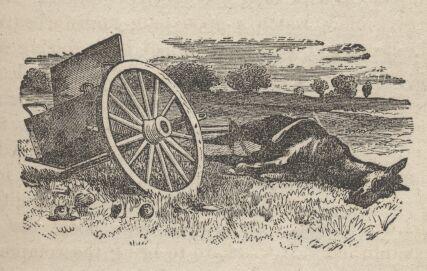Today the site of the station sits on private land owned by Olive Thompson. The limestone slab section of the original Pony Express station that Edna Patterson spoke of in her narrative is still partially standing among large cottonwoods at the mouth of Telegraph Canyon. Diamond Springs, overgrown with cat tail and salt grass, is located in the meadow nearby. There is another stone dugout among the trees, but no one knows how long it has been there. The structures are visible from the country road on the west side of the Diamond Mountains. There is a brass Pony Express centennial plaque mounted in a stone and concrete monument near the ranch house just one mile south of the actual station site.
Sources generally agree on the identity of Diamond Springs Station as a Pony Express station, although for no apparent reason Mabel Loving cites it as Drumong Springs. Richard Burton visited the station on October 9, 1860, and noted its Mormon stationkeepers and the site as a water source. According to Burton, the station was named after the "warm, but sweet and beautifully clear water bubbling up from the earth." Another source mentions that Diamond Springs received its name from Jack Diamond, a miner and prospector. Edna Patterson lists the stationkeeper as William Cox during the Pony Express era. Cox remained at Diamond Springs when the Overland Telegraph arrived and served as a telegraph operator and maintenance man for stations between Cherry Creek and Roberts Creek, Nevada.
To the Wilderness again 9th October
The frosty night was followed by a thaw in the morning. We hastened to ascend Chokop's Pass by a bad steep dugway; it lies south of Railroad Kanyon, which is said to be nearly flat soled. A descent led into Moonshine, called by the Yutas Pahannap Valley, and we saw with pleasure the bench rising at the foot of the pass. The station is named Diamond Springs, from an eye of warm, but sweet and beautifully clear water bubbling up from the earth. A little below it drains off in a deep rushy ditch, with a gravel bottom, containing equal parts of comminuted shells: we found it an agreeable and opportune bath. Hard work had begun to tell upon the temper of the party. The judge, who ever preferred monologue to dialogue, aweary of the rolling prairies and barren plains, the bald and rocky ridges, the muddy flats, saleratus ponds, and sandy wastes, sighed monotonously for the woodland shades and the rustling of living leaves near his Pennsylvanian home. The marshal, with true Anglo American impetuosity, could not endure Paddy Kennedy's "slow and shyure" style of travel; and after a colloquy, in which the holiest of words were freely used as adjectives, participles, and exclamations, offered to fight him by way of quickening his pace. The boys - four or five in number - ate for breakfast a quarter of beef, as though they had been Kaffirs or Esquimaux, and were threatened with ration cutting. The station folks were Mormons, but not particularly civil: they afterward had to fly before the savages - which perhaps they will be pleased to consider a judgment upon them.
(The City of the Saints, p 480-1)
